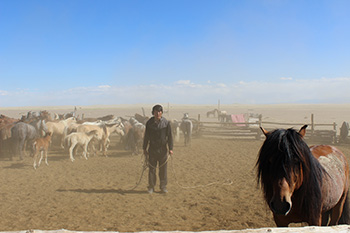
A new study, led by Ludovic Orlando of the Center for GeoGenetics at the University of Copenhagen, compared the DNA obtained from two well-preserved horse fossils between 16,000 and 43,000 years old from arctic conditions in Russia, with those of the Przewalski’s horse—the only surviving population of wild horses—and five breeds of modern horses, which were first domesticated some 5,500 years ago. The team detected a set of 125 candidate genes favored by humans in modern horses that involve physical and behavioral traits, including genes that were already known to evolve under strong selection in horses. Some of those genes affect the development of muscles and bones, which would have been necessary for utilizing horses for transportation. Other genes favored by domestication control the animals’ response to fear. Negative impacts could be seen in the increasing levels of inbreeding and the accumulation of deleterious mutations that can occur in small populations. The study revealed that Przewalski’s horses have a proportion of deleterious mutations similar to domesticated horses, due to their recent near extinction. Finally, the genomes revealed that the ancient wild horses contributed to the modern population of domesticated horses, but not to the Przewalski’s horses. “This confirms previous findings that wild horses were used to restock the population of domesticated horses during the domestication process,” said co-author Mikkel Schubert of the Center for GeoGenetics. For more on horse genetics, see "Dappled Horse Paintings Decoded by DNA."

No comments:
Post a Comment